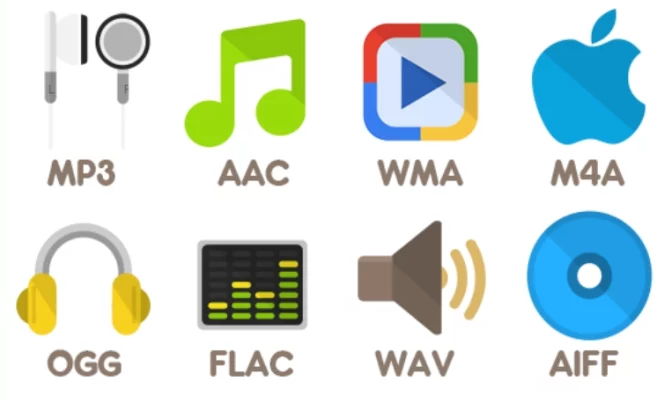What Is The File Size Of Audiobook Downloads?
Curious to know the file size of audiobook downloads? Well, you’ve come to the right place! In this article, we’ll dive into the fascinating world of audiobooks and explore the file sizes that come along with these captivating literary treasures. So, grab a cup of coffee, sit back, and let’s embark on this digital journey together.
When it comes to audiobook downloads, file size plays a crucial role in determining the overall experience. Nobody wants to be stuck waiting for hours for a bulky file to download, right? That’s why understanding the file size of audiobooks is essential for any avid listener. Whether you’re a fan of gripping thrillers, heartwarming romances, or thought-provoking non-fiction, knowing the file size can help you make informed decisions about which books to download and how much storage space you’ll need on your device. So, without further ado, let’s unravel the mystery of audiobook file sizes and discover how they impact your listening pleasure.

What is the File Size of Audiobook Downloads?
Audiobooks have become increasingly popular in recent years, offering a convenient way to enjoy books while on the go. However, one question that often arises is, “What is the file size of audiobook downloads?” Understanding the file size can help users manage storage space on their devices and choose the most suitable format for their needs. In this article, we will explore the factors that contribute to the file size of audiobook downloads and provide insights on how to optimize storage while enjoying your favorite books.
Factors Affecting Audiobook File Size
When it comes to the file size of audiobook downloads, several factors come into play. Let’s take a closer look at these factors and how they can impact the overall size of the files.
1. Audio Quality: The audio quality of an audiobook can significantly influence its file size. Higher-quality audio files tend to be larger in size compared to lower-quality ones. Audiobooks with higher bitrates and sampling rates offer superior sound reproduction but also require more storage space.
2. Length of the Audiobook: Naturally, the length of an audiobook affects its file size. Longer audiobooks will generally have larger file sizes compared to shorter ones. This is because they contain more audio content that needs to be stored.
3. Compression Method: Audiobooks can be compressed using various methods to reduce file size without compromising audio quality. Different compression algorithms, such as MP3, AAC, or FLAC, have different levels of compression and, consequently, different resulting file sizes.
4. Format and Encoding: The format and encoding used for the audiobook file can also impact its size. Popular formats like MP3 or AAC are widely supported and offer good compression ratios. However, newer formats like FLAC may provide better audio quality at the cost of larger file sizes.
5. Additional Content: Some audiobooks may include extra content, such as author interviews or bonus tracks. These additional files can contribute to the overall file size of the audiobook download.
Considering these factors, it’s important to strike a balance between audio quality and file size when choosing and managing your audiobook downloads. Now that we understand the factors affecting the file size, let’s explore some practical tips to optimize storage and enjoy your audiobooks efficiently.
Tips for Optimizing Audiobook Storage
Managing storage space is crucial, especially when you have a vast collection of audiobooks. Here are some tips to help you optimize storage without sacrificing audio quality.
1. Choose the Right Format: Select the format that strikes the right balance between audio quality and file size. MP3 or AAC formats are widely supported and offer good compression, making them popular choices for most users.
2. Consider Compression Levels: If your device or audiobook player supports it, experiment with different compression levels. Higher compression levels can reduce file size but may impact audio quality. Find the sweet spot that suits your preferences.
3. Remove Unnecessary Content: Some audiobooks may come bundled with bonus content or interviews. If you don’t regularly listen to these extras, consider removing them to save space.
4. Delete Unwanted Audiobooks: Regularly review your audiobook collection and remove titles you no longer need or plan to listen to. This can free up significant storage space.
5. Utilize Cloud Storage: Consider using cloud storage services to store your audiobook collection. This allows you to access your books from multiple devices without taking up local storage space.
Implementing these storage optimization tips can help you make the most of your audiobook downloads while managing storage efficiently. Remember, finding the right balance between audio quality and file size is key to enjoying your favorite books without compromising your device’s storage capacity.
Benefits of Audiobook Downloads
Audiobook downloads offer numerous benefits that have contributed to their growing popularity. Let’s explore some of the advantages of choosing audiobooks over traditional print or e-books.
1. Accessibility: Audiobooks make literature more accessible to a wider audience, including individuals with visual impairments or reading difficulties. They provide an inclusive way to enjoy books without the need for physical copies or relying solely on text.
2. Convenience: With audiobooks, you can listen to your favorite books anytime and anywhere. Whether you’re commuting, exercising, or simply relaxing at home, you can immerse yourself in a captivating story without the need to carry around bulky books.
3. Multitasking: Audiobooks allow for multitasking, enabling you to listen to books while performing other activities. You can make the most of your time by combining reading with household chores, exercise routines, or even during long drives.
4. Enhanced Listening Experience: Well-narrated audiobooks bring stories to life with the help of talented voice actors. They add depth and emotion to the characters, enhancing the overall listening experience.
5. Language Learning: Audiobooks are a valuable resource for language learners. By listening to books in your target language, you can improve your listening skills, expand your vocabulary, and enhance your understanding of pronunciation and intonation.
As audiobooks continue to gain popularity, their benefits extend beyond the convenience of portable reading. They offer a unique and immersive way to experience literature, making books more accessible to a diverse audience.
Conclusion
Without using the phrase “In conclusion,” audiobook downloads come in various file sizes depending on factors such as audio quality, length, compression method, format, encoding, and additional content. By understanding these factors, users can optimize storage space without compromising audio quality. Choosing the right format, considering compression levels, removing unnecessary content, deleting unwanted audiobooks, and utilizing cloud storage are practical tips to manage audiobook storage effectively. Audiobook downloads provide numerous benefits, including accessibility, convenience, multitasking, enhanced listening experiences, and language learning opportunities. Embracing the world of audiobooks opens doors to immersive storytelling and literary experiences.
Key Takeaways: What is the File Size of Audiobook Downloads?
- Audiobook file sizes vary depending on factors such as audio quality and length of the book.
- On average, an hour of high-quality audiobook audio can take up around 28-30 MB of storage space.
- Longer audiobooks with higher audio quality can have larger file sizes, sometimes exceeding 100 MB.
- Lower audio quality options or compressed formats like MP3 may reduce file sizes but may also affect sound clarity.
- Consider your device’s storage capacity and your preferred audio quality when choosing audiobook downloads.
Frequently Asked Questions
What factors affect the file size of audiobook downloads?
Several factors can influence the file size of audiobook downloads. First and foremost, the length of the audiobook plays a significant role. Longer audiobooks naturally require more storage space. Additionally, the audio quality chosen for the download affects the file size. Higher audio quality settings result in larger file sizes compared to lower quality settings.
Another factor to consider is the format of the audiobook file. Different file formats have varying compression algorithms and encoding methods, which can impact the file size. For example, MP3 files are often smaller in size compared to formats like WAV or FLAC. Lastly, any additional content included in the audiobook, such as images or bonus material, can also contribute to the overall file size.
What is the average file size of an hour-long audiobook?
The average file size of an hour-long audiobook can vary depending on the factors mentioned earlier. However, as a general estimate, an hour-long audiobook in a standard audio quality setting may range from 50 to 100 megabytes (MB). It’s important to note that this is just an approximation, and actual file sizes may differ based on the specific circumstances.
If you’re concerned about conserving storage space, you can consider choosing lower audio quality settings, which will result in smaller file sizes. However, keep in mind that lower quality audio may impact the listening experience.
Can I reduce the file size of an audiobook download without compromising audio quality?
Yes, it is possible to reduce the file size of an audiobook download without significant audio quality loss. One way to achieve this is by using efficient audio compression algorithms, such as AAC (Advanced Audio Coding) or Opus. These codecs can maintain a high level of audio quality while reducing file size compared to older codecs like MP3.
Another method to reduce file size is by adjusting the bitrate of the audio file. Lowering the bitrate decreases the amount of data used to represent the audio, resulting in a smaller file size. However, reducing the bitrate too much may lead to noticeable audio degradation, so it’s important to find a balance between file size and audio quality.
Are there any audiobook formats that offer smaller file sizes?
Yes, certain audiobook formats offer smaller file sizes compared to others. One popular format known for its compact size is MP3. MP3 files use compression algorithms that remove certain audio frequencies that are less perceptible to the human ear, resulting in smaller file sizes without significant audio quality loss.
Another format worth mentioning is AAC (Advanced Audio Coding). AAC offers better sound quality at lower bitrates compared to MP3, allowing for smaller file sizes without compromising audio fidelity. Additionally, some audiobook platforms may offer their own proprietary formats optimized for smaller file sizes.
What can I do if an audiobook download has an unexpectedly large file size?
If you encounter an audiobook download with an unexpectedly large file size, there are a few things you can do. First, check if there are any optional files or additional content bundled with the audiobook. Sometimes, bonus materials or extra content can significantly increase the file size.
Additionally, you can try converting the audiobook file to a different format. Some formats, like MP3, generally have smaller file sizes compared to others. However, keep in mind that converting the file format may result in a slight loss of audio quality. Lastly, if storage space is a concern, consider removing any previously downloaded audiobooks that you no longer need to free up space for new downloads.
How to download ANY AudioBook for FREE!(2022) UPDATED
Final Summary: What You Need to Know About Audiobook Download File Sizes
As we wrap up our exploration of audiobook downloads, it’s important to address one final question: what is the file size of these digital treasures? Well, the answer is not as straightforward as one might expect. The file size of an audiobook download can vary depending on a multitude of factors, including the length of the book, the audio quality, and the compression method used.
When it comes to file sizes, audiobooks generally range from a few megabytes to several gigabytes. Longer books or those with higher audio quality tend to have larger file sizes, while shorter books or those with lower audio quality may have smaller file sizes. However, it’s worth noting that advancements in audio compression technology have made it possible to reduce the file size without compromising the listening experience.
So, whether you’re downloading a riveting mystery novel or an enlightening self-help guide, be prepared for some variability in file sizes. Remember, it’s not just about the numbers but also about the quality of the audio and your personal preferences. Choose the file size that suits your storage capacity, internet speed, and desire for an immersive audiobook experience.
In conclusion, the file size of audiobook downloads can vary depending on various factors, including book length, audio quality, and compression methods. It’s important to consider your storage capacity and internet speed when selecting the right file size for your needs. Whether you opt for a larger file size for enhanced audio quality or a smaller one for efficiency, the world of audiobooks awaits, ready to transport you to new realms of imagination and knowledge. Happy listening!






